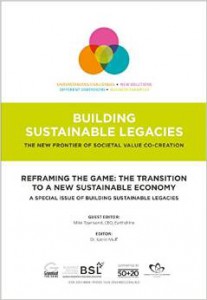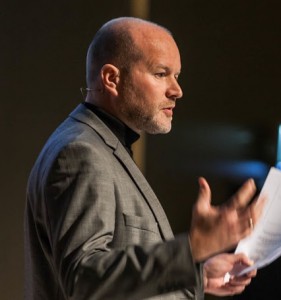Reframing the Game: The Transition to a New Sustainable Economy – Book Review
By Frank Came, Editor, GLOBE-Net
In Reframing the Game: The Transition to a New Sustainable Economy, Mike Townsend, Founder and CEO Earthshine, has set out on a difficult – dare I say – near impossible mission – writing from the future.
Difficult because the future never unfolds as we think it might. Impossible, because to paraphrase one of Mike’s quotes from Albert Einstein (“no problem can be solved from the same level of consciousness that created it”) we cannot define the future using levels of consciousness that may have little or no impact in creating it.
To his credit, and as evidenced by the insights provided by his stellar team of professionals from around the world working at the forefront of knowledge creation, Mike acknowledges that the seeds of the future are already taking root in the way people and businesses are evolving. The quiet revolution is already under way, he notes, adding “if we could just allow it to flourish”.
This is a far cry from his earlier declarations atop the ramparts of Capitalism 2.0 calling for radical changes to our economies and our lives towards a more sustainable economic system.
The activist Mike Townsend seeking radical change is still there, but as he acknowledges the Sustainable Economy Project was born out of a desire to create a better economic system coupled with a passion to encourage a progressive form of economic activism that will help achieve this aim – meaning achieving the quiet revolution requires well measured patience and a clear strategy.
The thought leaders he assembled to develop the agenda for change have contributed some important insights on the leverage points for change, not only for the goals and mechanics of our economic system, but also for institutions and social values that in the fullness of time will reshape those goals and mechanics.
It is here where we enter the realm of Einstein’s caution. We cannot define the future today; but we can fashion the tools and shape the minds of those who in turn will define the future they wish to inhabit.
And this is where Reframing the Game provides real value, because each of the authors have contributed insights that: redefine our concepts of business success; set out new parameters for finance and banking systems; define new social and governance institutions that will lead to greater systemic resilience and more localized economies; and provide educational curricula and learning models to shape the minds of tomorrow’s business and government leaders.
The transformation that is required to achieve these ends is every bit as radical as envisaged for Capitalism 2.0. But the underlying premise is one of a quiet transformation that changes the way people think and institutions act without thunderous cannon or battle, rather because change it seems like the sensible thing to do and it gets done.
Paul Polman, CEO Unilever and one of the most outstanding business leaders of our generation does not mince words in describing the enormity of the many challenges the world faces: rising unemployment, poverty, food security, climate change, geopolitical instability and growing Inequality, itself a fuse for explosive disorder.
But he makes it abundantly clear that Unilever is pioneering a model that puts addressing the world’s challenges at the heart of its business operations and corporate strategy. The rationale for this approach is quite straightforward, notes Polman. The global economic system wherein which we all live and work shapes our behaviours and choices. Because business is responsible for more than half the world’s GDP, we cannot change the economic system unless we change business.
Managing these changes will require “business leaders with different mindsets and capabilities, notes Polman, men and women who can successfully build cross-sector coalitions, who are as familiar dealing with NGOs and policymakers as they are with customers and suppliers, and who are comfortable operating in a more volatile and complex environment”.
This is where management education must play a decisive role in preparing the business world for a more collaborative future, and this is where Katrin Muff of the Business School Lausanne, Switzerland makes an important contribution with the concept of the Collaboratory, a methodology that re-imagines what is relevant for business education in order to meet the challenges Paul Polman describes in order for business to make a meaningful contribution to society.
The importance of management education as a key driver of transformation is picked up in other articles in the collection. The chapter Purpose at the Heart of Strategy by a team from the University of Technology, Sydney presents findings from an exploratory study of educators at a university where sustainability is incorporated in business and other areas of the teaching curriculum and where a community of practice has been developed to share sustainability-related material across the disciplinary areas.
Business law is one area where shared perspectives on sustainability have relevance. Beate Sjåfjell from the University of Oslo argues that reforming business law is a necessary adjunct to the greening of economies and societies. While her article focuses on European business law, the same arguments apply to other regions of the world. Sjafjell argues that neither the voluntary contribution of business, nor the current regulatory framework is sufficient in driving the level of change needed.
As Mike Townsend noted at the outset, a key question throughout the book focused on the purpose of business and wisely he ends off the insights with living example of a major global enterprise that is reinventing itself.
Gabi Zedlmayer, Vice President and Chief Progress Officer of HP shares how HP embraced the recognition that integrating purpose into business strategy was essential, not only for society, but also for long-term business growth and the transition to a sustainable economy.
Notes Zedlmayer, companies that shift their thinking about sustainability from a sideline activity to one that’s embedded in their business strategy ignite new opportunities for growth.
Often companies make this shift when faced with a crisis, such as risks to their supply chain or a financial crisis, she notes. Don’t wait for the crisis to strike, she cautions, noting that “Integrating sustainability into the heart of a business inspires game-changing innovation, progressive problem solving, and highly engaged and motivated employees.”
It’s this collective shift to purpose-driven business strategy that drives the transition to a more sustainable economy, which in turn will address the toughest challenges that Unilever’s Paul Polman identified.
The enormity of the challenge inherent in the transformation of the economy on the scale anticipated by the various contributors to this volume is daunting to say the least. In a well ordered, logical and well managed economic system, the transition might proceed more or less as prescribed. But reality is never so kind.
The question posed by Townsend with respect to What is Capitalism carry double weight here: “If we do what is truly required, if we no longer seek to exploit people and resources, in the name of accumulating and concentrating wealth — if we no longer focus on the primary interests of financial capital, can we still call it Capitalism?”
The exploitation of people and resources in the name of accumulating wealth is a pillar of various economic and political systems throughout the world and that is not likely to change easily or without turmoil.
Hence the Mission Impossible dimension of Reframing the Game. If we choose to accept the mission there is no guarantee that we’ll achieve the more sustainable future we desire.
Acting now to change the future carries with it the risk of failure. But as Paul Polman points out in his excellent article the cost of inaction far exceeds the cost of action.
Mike Townsend is to be commended for bringing the insights of these thought leaders together for our review and digestion. Their insights show that changing the world is not for the faint of heart, but what a rush!
 Citation: Reframing the Game: The Transition to a New Sustainable Economy A Special Issue of Building Sustainable Legacies Guest Edited by Mike Townsend, CEO, Earthshine April 2015 180 pp 248 x 171 mm journal ISBN 978-1-78353-511-8
Citation: Reframing the Game: The Transition to a New Sustainable Economy A Special Issue of Building Sustainable Legacies Guest Edited by Mike Townsend, CEO, Earthshine April 2015 180 pp 248 x 171 mm journal ISBN 978-1-78353-511-8




